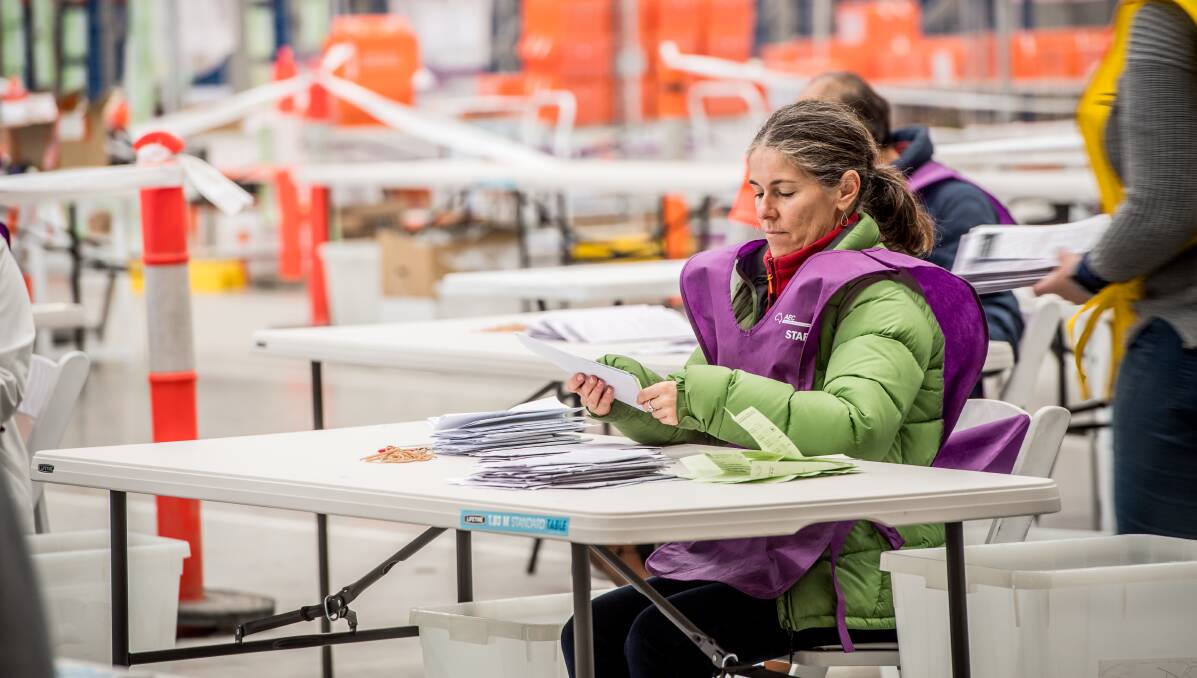
Early voting should be expanded to allow this year's territory election to be held safely amid the COVID-19 pandemic, the ACT Electoral Commission has recommended.
Subscribe now for unlimited access.
$0/
(min cost $0)
or signup to continue reading
The commission has been forced to reassess the planning for, and staging of, the October 17 ballot because of the disruptions caused by coronavirus.
In a special report presented to Speaker Joy Burch on Thursday, the commission said that due to the uncertainty surrounding the virus, it had to be assumed that the threat of further outbreaks and social distancing restrictions would still exist during the election period.
It said it urgently needed to settle on a model for conducting the ballot which mitigated health risks to the community and its staff, while ensuring the integrity of the electoral process.
The commission examined six options for conducting the ballot, including moving to universal online or postal voting, delaying the election date or maintaining normal procedures.
The commission flagged cyber-security risks with a complete transition to online voting. Conducting the election via postal votes would pose health risks to the staff who would have to process the 300,000-odd voting packs.
Delaying the election date wasn't a suitable option, it said, because of the risks surrounding the standing of the caretaker government and the uncertainty in the delivery of community services. The move could also run the risk of increasing the "disenfranchisement" of voters.
It ultimately recommended that the election go ahead on the scheduled date, but with "significantly expanded" early voting. It called for 15 early voting centres to be opened from 8am to 8pm for 20 days before the Saturday election.
Under normal circumstances, five polling stations would be opened from 9am to 5pm, with extended hours on the final Friday.
The commission said this approach would mean that the "voter load" would be spread out across a number of locations over the course of the polling period.
"This option provides a greater number of opportunities to vote over extended periods in the absence of crowds and associated risks of potential contamination through breaching of social distancing requirements," the commission said.
It said a media and public information campaign should be held to highlight the benefits of early voting.
READ MORE:
The commission's recommendations were based on the advice of ACT Health, ACT Policing, the solicitor-general's office and cyber-security experts, who were part of a special taskforce set up to assess contingency plans for the election.
Both major parties have previously supported the election going ahead on October 17. Changing the date of the ballot would have required a vote in the ACT Legislative Assembly to amend the territory's Electoral Act.
Changes that would allow for more early voting could be achieved through regulation, a relatively simple process in comparison.
The commission has requested an extra $2.6 million in funding to help stage the election under the unprecedented circumstances.
The report highlighted the scale of the disruption to the electoral process caused by COVID-19, detailing possible implications for voters, electoral commission officials and party candidates.
The physical distancing restrictions meant there was a "reduced ability" for candidates to doorknock homes or participate in public forums. Those forms of electioneering were particularly important for smaller parties and independent who had small budgets and low public profiles.
The report warned of potential staffing problems during the election period. It said older officials might choose to miss this year's election to avoid sustained contact with members of the public.
An outbreak of the virus among polling staff could have significant consequences for the election, the report found.
If there were fewer officials manning the polling stations, the commission feared there could be "longer queuing times and greater elector exposure to infection risks; and an increased risks to the reputation of the commission through delayed results, potential errors and complaints".


